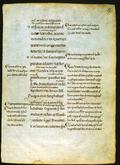Rochester Institute of Technology Leaf 01
Described by Ege as early 12th century Swiss, this leaf is from a New Testament with glosses by church fathers including Bede, Jerome, and Gregory. The primary script is Carolingian, with one of the glosses in a minuscule very similar to that in Leaf 04. The gloss hands are different from both one another and from the Biblical text, and the Carolingian gloss hand has decorative brackets setting apart each section. See Denison University Leaf 01 for more information on this manuscript.
Text: John 12:3-9 (recto). A scan of the verso is not currently available. Glosses not yet identified.
 Rochester Leaf 01 Recto
Rochester Leaf 01 Recto
Rochester Leaf 01 Recto
 Rochester Leaf 01 Recto Transcription
Rochester Leaf 01 Recto Transcription
[Transcription of the main text in the central column:]
ex odóre unguénti. Dixit ergo unus ex discípulis ejus, Judas Iscariótes, qui erat eum traditúrus: Quare hoc unguéntum non véniit trecéntis denáriis, et datum est egénis? Dixit autem hoc, non quia de egénis pertinébat ad eum, sed quia fur erat, et lóculos habens, ea quæ mittebántur, portábat. Dixit ergo Jesus: Sínite illam ut in diem sepultúræ meæ servet illud. Páuperes enim semper habétis vobíscum: me autem non semper habétis. Cognóvit ergo turba multa ex Judis quia illic est, et venérunt, non propter Jesum tantum, sed ut Lázarum vidérent, quem
 Rochester Leaf 01 Recto Translation
Rochester Leaf 01 Recto Translation
[John 12:3-9]
...and wiped his feet with her hair; and the house was filled with the odour of the ointment. 4 Then one of his disciples, Judas Iscariot, he that was about to betray him, said: 5 Why was not this ointment sold for three hundred pence, and given to the poor? 6 Now he said this, not because he cared for the poor; but because he was a thief, and having the purse, carried the things that were put therein. 7 Jesus therefore said: Let her alone, that she may keep it against the day of my burial. 8 For the poor you have always with you; but me you have not always. 9 A great multitude therefore of the Jews knew that he was there; and they came, not for Jesus' sake only, but that they might see Lazarus, whom he had raised from the dead.